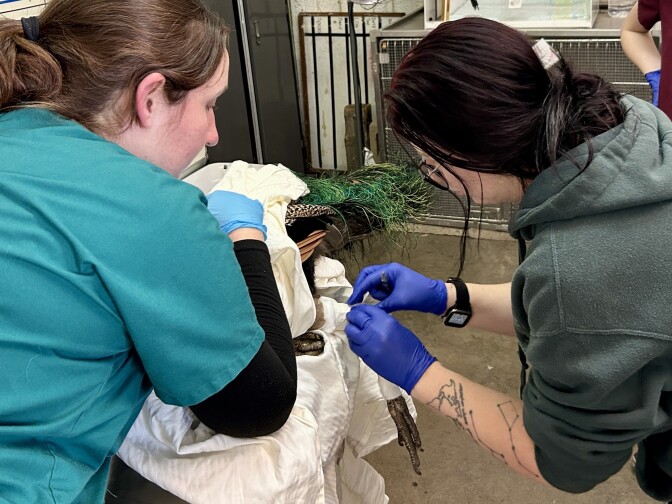This story is free to read because readers choose to support LAist. If you find value in independent local reporting, make a donation to power our newsroom today.
You might see injured wild animals in fire areas. Here's what to do

LAist relies on reader donations to power our nonprofit newsroom's coverage of wildfire and breaking news. Support LAist by giving now.
The L.A. area fires that have destroyed homes have also burned through thousands of acres of wildland that’s home to bears, mountain lions, squirrels and other animals. Wildlife rehab centers across Southern California are already taking in injured animals — and people are likely to come across more of them as they're allowed back into evacuated areas.
Here's what you need to know:
Why it matters
Wildlife displaced from the burn area — potentially including bears, mountain lions, American badgers and ring-tailed cats — may wander into surrounding neighborhoods. They might have burnt paws or singed feathers, making it hard for them to flee and find food or water.
Also, some of the facilities that normally help injured wildlife recover are located in areas that were threatened by the fires and had to evacuate. This was the case for the California Wildlife Center in Calabasas, although they've since been able to reopen and are again accepting patients.
Wildlife is already stressed
Mountain lions living in the area are already facing severe inbreeding and a lack of territory, and bears and coyotes have fraught relationships with Angelenos.
Plus, black bear mommas might be either majorly pregnant or caring for newborn cubs — cubs are typically born in January and February.
How to help injured wildlife
If you come across an injured animal, keep your distance and don't feed it — doing so might prompt them to come back for more instead of going back to their own habitat.
"We want them to keep moving on if they're healthy," according to the Wetlands and Wildlife Care Center in Huntington Beach, which has been taking in injured wildlife from the Palisades and Eaton fires.
This video from the California Wildlife Center further explains why not to feed wildlife, and how best to help them:
If you come across injured wildlife, contact the following organizations for advice and assistance.
- For the area hardest hit by the Eaton Fire: Pasadena Humane: 626-344-1129 (text)
- For the area hardest it by the Palisades Fire: California Wildlife Center: 310-458-9453 (WILD)
- The Wildlife Disaster Network: 800-942-6459
- You can find contact information for licensed wild animal rehabilitators on the website of the California Department of Fish and Wildlife, or email the department: R5WildlifeReport@wildlife.ca.gov
Go deeper
- For a closer look at the challenges of human coexisting with wildlife in urban Southern California, check out the LAist podcast, "Imperfect Paradise: Lions, Coyotes, & Bears," which explored the challenges of coexisting with wildlife in urban Southern California.
Listen to our Big Burn podcast
_
Fire resources and tips
If you have to evacuate:
- Why fire officials don't want you to stay and defend your home
- How to get packed up
- How to leave your house
- What evacuation terms mean and how to sign up for alerts
Navigating fire conditions:
- How to drive in high winds and fire danger
- How to prep for power outages
- How to navigate poor air quality
How to help yourself and others:
- Resources for fire victims, evacuees and first responders
- If you want to help fire victims, resist the urge to volunteer
- How to help find lost pets
How to start the recovery process:
- What to do — and not do — when you get home after a wildfire
- How to make an insurance claim
- How to safely clean up wildfire ash
What to do for your kids:
- How to talk to children about wildfires and losing a home
- What parents should know about wildfire air quality
Prepare for the next disaster:











